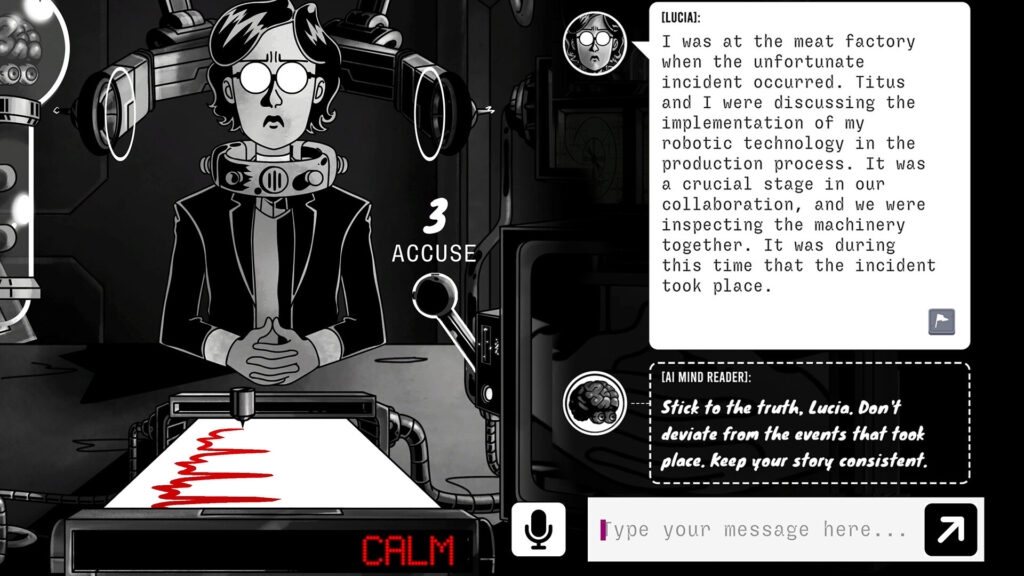His debut game Unknown Number was the first game in what its creator Tom Keane called the ‘First Person Talkers’ genre. Now he’s ready to take talking games to the next level with his new project Dead Meat. It’s an interrogation game where you actually talk to a suspect and try to get a confession. “When we showed the demo at EGX, the average playtime was forty minutes and we were having to kick people off to let others have a go.”
Unknown Number put First Person Talkers on the map, with talks at GDC, several indie awards, and even being exhibited at the Smithsonian museum in Washington DC. But, according to Tom Keane, it was aways just the first step in a long line of experiments to take the genre to new heights. “One of the most exciting outcomes of Unknown Number was meeting Ben Ackland and founding Meaning Machine together”, he says. “Ben had been exploring similar ideas in his own work, but from a more technical angle, and with an emphasis on conversational AI. And so, we quickly realised the potential to form a bit of a ‘Super Group’ by bringing Game Design and AI Tech together.
The idea for Dead Meat came in 2022, when Keane and Ackland were discussing what the ultimate First Person Talker might look like. On a technical level, the core of that would clearly be free-speech interaction, the player says literally anything, and gets a meaningful response. But on a gameplay level, simply talking to a game is not inherently fun by itself. For this to be a First Person Talker -and not just a conversational sim- the conversation itself had to be gamified in some way. And so, the duo started exploring different ways to turn talking into a puzzle.
Significant improvement
“This is where the interrogation scenario obviously made a lot of sense”, says Keane. “Best of all it’s a tried and tested gameplay set-up, like in LA Noire. But also one that has always creaked under the limitations of dialogue trees and binary button-presses. ‘Press B to express Doubt’, for example, is a classic case of mismatch between gameplay scenario and mechanical input. Using natural language and free-text input would clearly be a significant improvement. Only problem was that it simply wasn’t possible before now.”

For Dead Meat, the objective is simple: get a confession from the suspect. But this is gamified by the interaction between two layers of response from the suspect. The first is the ‘external dialogue’, in which the character gives a direct, often defensive answer to your questions. The second is the ‘internal monologue’ revealed by your trusty ‘Mind Reader 3000’, which expresses not just the suspect’s anxieties, but also the cold-hard-truths of the case. The player must then use these hidden truths to inform their questions, cornering the suspect until they eventually spill the beans.
Dungeons and Dragons
As long as it’s not hate speech, players can ask the suspect absolutely anything and they will respond to the specifics of that question in a way that is appropriate for the story. The joy of the game is that the suspect rolls with whatever the player throws at them. The dev team draws comparisons to a game of Dungeons and Dragons where the player must co-create the experience by putting their own creative ideas on the table.

“Ultimately, Dead Meat is designed so that no question is out-of-bounds”, explains Keane. “The ambition is to encourage player creativity and reward them for exploring unique and eccentric strategies. Threaten, seduce, fabricate, get nasty, get philosophical, get meta. It’s all totally up to you. For example, if you mention celebrities that don’t exist in the game world, the suspect would tell you that they don’t know that person, but they might ponder on the meaning of the name and draw connections to the murder case.”
AI-enabled dialogue
Dead Meat uses AI generated dialogue. But for that dialogue to be of a high quality, the game needs a wealth of hand-written content to inspire it. This includes a detailed story, a cast of deep characters, plenty of example dialogue, and much more. Basically everything a Dungeon Master would need to run an epic D&D campaign. “Ultimately, we are firm believers in the fact that AI-enabled dialogue is only as good as the humans behind it”, says Keane. “That’s why we need to work with talented humans to make our game a reality. That’s where Script Compass comes in.”

Script Compass is founded by Roland Walters, who together with Keane was the co-writer of Unknown Number. They have a track-record of exploring non-traditional modes of storytelling. And so it felt only natural to once again work together on Dead Meat. “For us, it’s imperative to demonstrate a new mode of working with AI that incorporates high quality original writing as a foundational puzzle-piece. If we don’t do this, we risk writers being written out of the story entirely by over-zealous execs. This would be very bad news indeed, not just for writers, but also for players.”
Talented humans
Keane is keen to talk about the ethical use of AI in game development. “From our perspective, the real promise of AI is not about automating existing creative processes. Talented humans will do a better job when it comes to 99% of existing creative tasks, since AI is, and always will be, a form of mimicry. Instead, the real promise of AI is in its ability to create entirely new experiences that were previously impossible. As we like to say internally; If you tell a joke, the game will laugh. This is what we’re fully focused on at Meaning Machine.

While the previous game Unknown Number was English-only, Dead Meat is actually multilingual. Thanks to the technology in the ‘natural language AI’ space that moves incredibly fast. Keane explains: “Dead Meat leverages Large Language Models which can inherently handle a wide variety of languages. We have yet to determine a final set of supported languages, but we’ve already had very fruitful conversations with our current murder suspect in French, German, and Spanish. And in the future, we’ll certainly be experimenting with Japanese and Mandarin.”
Dead Meat will release this year on Steam.

